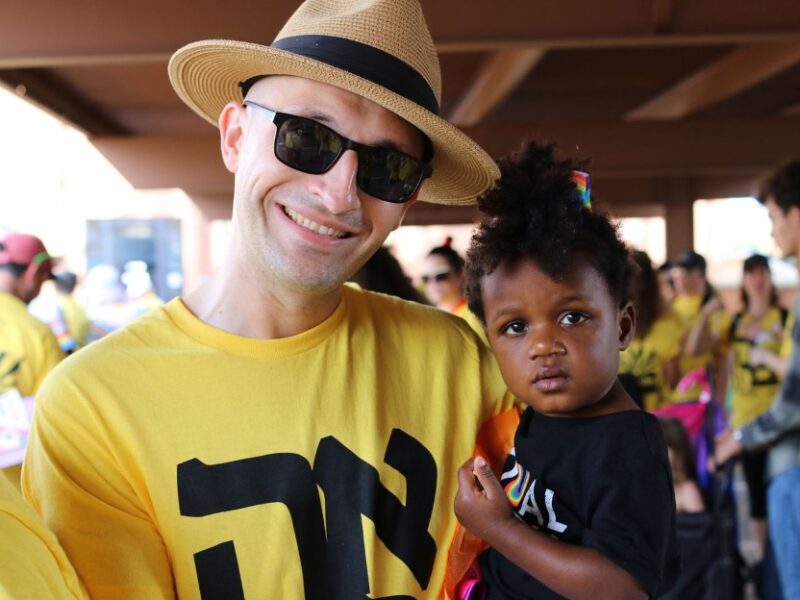“Don’t wear horizontal stripes,” her mother would say. “They emphasize your big hips.” It’s hard to believe that Robin Brody would ever have worried about that. Her trim, athletic body is no doubt the envy of many women of all ages. Robin started running at age 54 and has run five full marathons in the past eight years.
But what keeps her running is not something anyone would envy. In the fall of 2006 Robin and her husband, Barry, took their son Jeff to the University of Miami for college. Not long after that, Robin answered the phone to hear Jeff say, “Mom, I think I’m going to die and I’m not kidding.” Barry jumped on a red eye. Jeff, who had always been healthy, had been vomiting and bleeding severely for days. Fellow students took him to the ER, but no diagnosis was made. After another call and flight, Jeff received a diagnosis of Crohn’s Disease.
Barry called Robin and said, “I think there’s a support organization in town – go find them!” Crohn’s, an incurable digestive disease, is among the inflammatory bowel diseases that affect at least 1.4 million Americans, including 150,000 children. Other IBDs are ulcerated colitis and irritable
bowel syndrome. Unofficially, these are often referred to as “Jewish diseases,” because Ashkenazi Jews are disproportionately affected. The disease is named for Dr. Burrill Bernard Crohn, of German Jewish parentage, who trained at Mount Sinai Hospital before gastroenterology even existed as a specialty. In 1930 he encountered his case “Number One,” and in 1932 he published the seminal paper on the “new” disease, which was soon
called by his name.
Though research suggests a genetic basis, it has yet to identify the specific mutated gene for the disease. According to The Crohn’s Advocate, a publication from the Crohn’s and Colitis Foundation of America, a relative of someone with Crohn’s is 10 times more likely to get the disease, and 30 times more likely if it’s a sibling. Crohn’s can affect the GI tract anywhere from the mouth to the anus. It is often diagnosed between the ages of 15 and 35, and is found equally in males and females. Difficult to diagnose, the disease often takes up to three years for proper diagnosis. A variety of medications are used to try to control symptoms, but many have significant side effects. Patients use trial and error to judge which medication works for them. Diet and physical activity also enter into the equation. Up to 75% of patients require surgery, often requiring the removal of portions of their intestines.
So, when Robin Brody heard her son’s diagnosis, she wasted no time finding the Southwest chapter of CCFA, and she has been forever grateful. Jeff received a variety of treatments until he was put on Humira, a drug that combats auto-immune diseases and is a relatively new treatment for Crohn’s. Treatment enabled him to graduate from the University of Miami. Currently in remission and living in California, he is a production assistant at Lakeshore Productions.
But CCFA staff know such diseases affect not only the patient but all those around him. The support organization provides educational programs, runs support groups and fundraises for research. It also provides Camp Oasis for those aged 7-17, with sites across the country. Those from Arizona attend Roundup River Ranch in Gypsum, CO. The Southwest chapter has raised funds to send 17 children this year.
While many nonprofits hold an occasional walk or run to benefit their organization, CCFA focuses on these events almost exclusively. Team Challenge is CCFA’s endurance training and fundraising program. Whether or not you have any background in running, Team Challenge will put you on a custom weekly training program run by professional coaches. Steve McGinnis, the Southwest Chapter’s endurance manager, emphasized that if walking is your comfort level, they’re happy to work with you on that as well.
The program prepares you to participate in half-marathons (13.1 miles) held across the country. While you get in shape, you also learn to fundraise through sample solicitation letters and the help of the team, who quickly become “family.” Not ready for a half-marathon? CCFA also sponsors “Take Steps – Be Heard” for Crohn’s and Colitis. The non-competitive walking route is generally about 2 miles, and participants are encouraged to put together teams to help raise both awareness and funding. A recent walk at Kiwanis Park in Tempe was organized by local walk manager Megan Livengood, who is responsible for Tucson, Albuquerque and Las Vegas, as well.
In Robin’s case, the fundraising meshed perfectly with her desire to keep fit while doing all she could to help her son. Because of recent ankle injuries she shifted to a race walk, but she’s nearly as fast as before. Labeling herself a “professional nonprofit volunteer,” Robin also hosts a variety of smaller events in the community, such as a Painting Party she organized at Carrie Curran Art Studios in Scottsdale in May. She credits CCFA with saving her from absolute devastation. “Talking to others who have similar situations, being able to confide, listen, hug and work together – it’s been exactly what I needed to get through all this,” she says.
Robin set a goal to raise $50,000, but she’s already raised that much for multiple nonprofits from her charitable running, and she’s not ready to stop. She explains: “I am thrilled to mentor people to push themselves to be successful with our program. I always tell them that I measure my success by their success. It is so exciting to cross the finish line with them and share that joy of accomplishment and victory. I just hope my limbs can hang in there!”
She recently went on a week-long ski vacation with her family and managed quite well, so it looks like she’ll be hanging in there for many years. And now she can wear all the horizontal stripes she wants.





